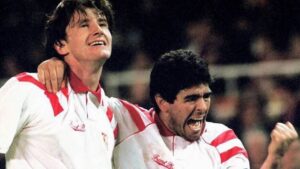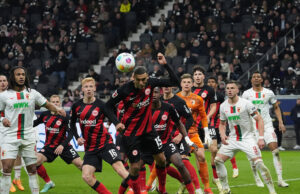This summer’s World Cup was the most enjoyable tournament for England football fans in a startlingly long time. While football did not come home in the end, a genuine connection with the young squad certainly did. The cliques of past squads were dismantled and their penalty shoot-out demons were banished.
However, to mark Russia 2018 as a completely new dawn would be an overstatement. For all England’s improvements, there were still haunting familiarities. Losing consistently against better-ranked teams and a lack of total control against others were, again, evident. But the most glaring of these was the lack of a midfield creator. A general who controls the midfield tempo and, if better than the opposition equivalent, often the whole game.
The Issue at the Centre of England’s Creative Sparsity
England’s Recent Fixtures
Jordan Henderson has played this pivot role at the base of midfield for England since Gareth Southgate took over. Despite incisive forward passes on occasion and great performances for Liverpool, he is not capable of dominating a midfield. Nowhere was this more obvious than against Spain in England’s first UEFA Nations League fixture. A midfield of Sergio Busquets, Thiago, Isco and Saúl utterly dictated the game, with equal parts functionality and artistry.
Henderson cannot be blamed for this. Chasing those players around alone would be nigh-on impossible for anyone not named N’Golo Kanté. His replacement must possess an innate understanding of the rhythm and flow of the elite international game. Southgate has made it clear he wants his side to keep hold of the ball; finding the right player to run everything through will be imperative.
The Established Names
Henderson has been rotated with Tottenham’s Eric Dier (33 caps), who captained England against Switzerland. Arguably his positional versatility has hindered him truly honing his craft. He will forever be an English hero after scoring the winning penalty in the shoot-out against Colombia, but is not as dynamic as other alternatives, with or without the ball.
A more dynamic choice would be Liverpool’s Alex Oxlade-Chamberlain (32 caps), who cruelly missed both the Champions League final and the World Cup after a severe knee injury. He possesses the drive and dribbling ability to beat the pressing opposition, but this fast-paced nature of his game must be complemented by a more measured approach.
Our top 10 Champions League goals this season 👌
Time for number 9️⃣…
Alex Oxlade-Chamberlain's ferocious strike as Liverpool beat Man City 🚀pic.twitter.com/W21fO3v9lc
— Football on TNT Sports (@footballontnt) May 21, 2018
Unlike Jurgen Klopp’s team, the midfield general England need must establish a hold of the game by dictating the tempo, which means playing fast and slow. Oxlade-Chamberlain would fit into a different formation: rather than playing a 3-5-1-1, he would suit playing a 4-3-3, with driving runs in attack and relentless pressing in defence.
Despite inevitable rotation in a Manchester City side chasing four trophies this season, Fabian Delph (15 caps) cannot expect to start a huge number of games in front of City’s incomparable midfield. Should he manage to, Delph is England’s most established natural fit. Under Pep Guardiola, he has shown an understanding of how to play short passes around the midfield and dictate tempo. Southgate insists England will play out from the back and he could utilise Delph’s renewed understanding of this. Still only 28 years-old, Delph’s tutelage under Guardiola has helped him improve significantly since his 2014 England debut.
The Next Generation
As shown by their recent successes at youth level, England’s younger players are blessed with some immense talent. For simplicity, the inevitable debate of whether they will get a chance with their domestic clubs will be pushed to one side. There are some highly-skilled youngsters that, at home or abroad, have shown they are more than capable of developing into the midfield general that England desperately need.
Should Harry Winksstring a succession of games together for Tottenham, he could be just that. Against Real Madrid in last season’s Champions League, with Toni Kroos and Luka Modrić, he played with a finesse and confidence beyond his years. He took control of the game and, in his sweeping pass to find Kieran Trippier for his assist for Dele Alli, showcased his passing talents.
Manchester City’s Phil Foden is another hugely gifted technician with the potential to transform the England midfield. Crucially, however, both Pep Guardiola and Gareth Southgate have been quick to stress he will not be rushed into playing regular top-level matches. With due time to develop, the England national side may not see the finished article until the next tournament cycle in six-eight years.
But his ability on the ball already is startling. He was crucial in England’s victory in the U17 World Cup and, on the occasions he has played for City, he has looked very assured. He can ride challenges, dribble past players and rarely picks the wrong pass. The intangible understanding of the ebb and flows of top-level football will be grasped with further experience. If he can translate this to the national setup, he will be an indispensable part of future England sides.
England Have the Right Man at the Helm
After the Spain game, Southgate was admirably pragmatic in his comments. “We can either go back to our old style and we’ll never be a top team” he mused. “Or we can keep trying to do what we do and suffer at times.” He should be applauded for this. In halting the pantomime circus that surrounds the fortunes of the English national team and its manager, he can look forward. Rather than looking to reinvent the wheel after each defeat, Southgate looks to tweak things.
The most pressing of those tweaks is the lack of creativity in the midfield. England’s youngsters certainly look like they have the technical skill and tactical understanding to develop into what Southgate wants. The man should be given due time to see the fruits of their labour come to fruition.
Main Photo






